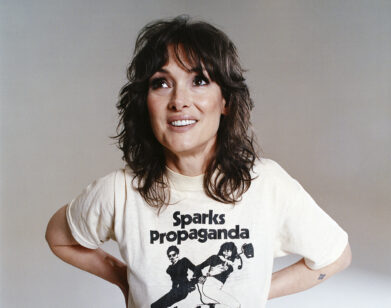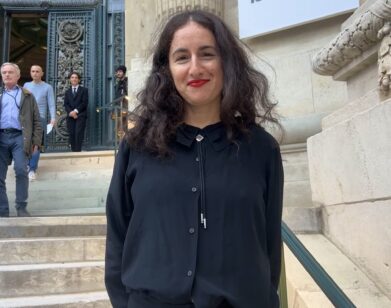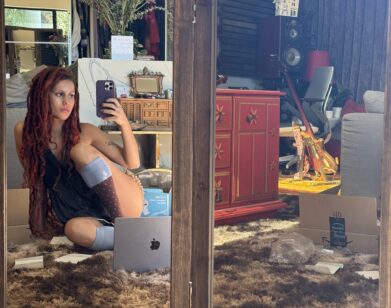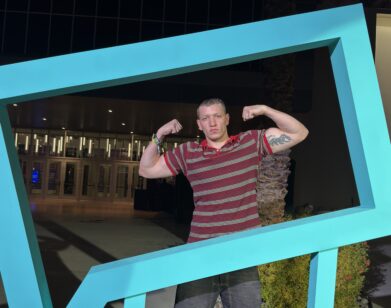To Hell and Back with Anson Mount
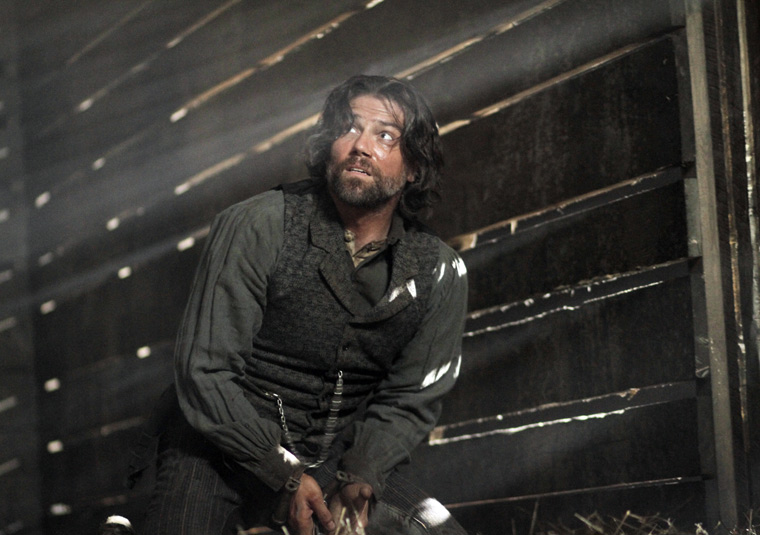
ABOVE: ANSON MOUNT IN HELL ON WHEELS. PHOTO COURTESY OF CHRIS LARGE/AMC.
In AMC’s Wild West drama Hell on Wheels, Anson Mount plays Cullen Bohannon, a man determined to avenge the brutal murder of his wife and son during the Civil War. As Bohannon, Mount hearkens back to the John Wayne era, where masculinity meant scowling, slugging whiskey, wordlessly saving damsels in distress, and being a straight shot (regardless of the volume of whiskey consumed). The role seems to agree with him.
Now 39, with salt-and-pepper hair and a gruff beard, it’s hard to imagine Anson Mount ever gracing the pages of Seventeen. Before the Tennessee native was cast alongside Common and Colm Meaney in Hell, however, he was most famous for playing Ben, the innocuous bad-boy love interest in the 2001 Britney Spears film Crossroads. Sometimes it takes a rancher’s hat to prove that you’re more than just a pretty face.
This week, Hell enters its second season. Interview called Anson in Calgary to find out how you turn revenge into a multi-season show and what it’s like working with Common.
EMMA BROWN: Hi Anson. Where are you right now?
MOUNT: I’m on my way to location in Calgary.
BROWN: Oh, you’re still shooting season two of Hell on Wheels?
MOUNT: Yeah, we’re shooting through the end of August.
BROWN: What’s your plan for after that?
MOUNT: My mom is playing in the USGA. She’s a former professional golfer and now she plays the amateur circuits. She finished in the quarterfinals for the USGA last year, so she’s playing again this year and I’m going to caddy for her.
BROWN: Did you do that for her when you were a child?
MOUNT: Not so much. It’s something I started doing for her in the last six or seven years.
BROWN: I heard that your dad wrote for Playboy.
MOUNT: Yeah, he was the sportswriter for the magazine. Before that, he was the religion editor. He was one of the original executives.
BROWN: Religion?
MOUNT: Yeah, it catches a lot of people by surprise when they hear that, but Playboy ran a religion column from its inception, until the late—maybe mid—’60s. I think it was a very smart thing to do; instead of a boycott, they decided to open up a forum for debate, and my father was the editor of that column. Then they came up with the idea of the “Pigskin Preview” [Playboy‘s annual college football section] and asked if anybody had any sports experience, nobody raised their hand, and my father said “Well, I watch the games on Saturdays.” So, without any previous experience, my father was suddenly named a sportswriter, and he immediately contacted all the sports and athletic directors in the country asking for help. [laughs] For a long time he was the best football and basketball prognosticator in the business.
BROWN: Did you get to go to a lot of games with him?
MOUNT: Well, we lived in rural Tennessee and at the time, we didn’t have any pro teams. So not really, no.
BROWN: It’s funny to think of a sportswriter living far away from all the action. Let’s talk about Hell on Wheels. What is Cullen going to do once he gets his revenge? It’s sort of his entire raison d’être at the moment.
MOUNT: Are you so sure he gets his revenge?
BROWN: Well, there is a conveniently large amount of people he needs to track down and kill, but he’s very focused…
MOUNT: [laughs] Well, you got to understand that when you take a television show past the first season, your biggest challenge is to move from plot-based development to character-based development. Because you simply can’t sustain chasing after revenge for six seasons. It’s like Breaking Bad for me, if you had five seasons just about what it’s like to cook crystal meth, it wouldn’t be the show that it is. It matters in that it’s inherent in the plot, but in the second season it becomes about Walter White’s ego, and that you can sustain; you can write about it and you can develop a very interesting character reversal. You can’t have six seasons about revenge. You simply can’t do it. So, the revenge is still there, but it’s not going to be the primary focus of the show. The show is about one thing and one thing only: ambition and dealing with the dark side of ambition.
BROWN: Do you think Cullen’s a good person?
MOUNT: [laughs] Good and bad are really arbitrary words when it comes to character. I think if I look at my characters in terms of black halves and white halves, I’d be a really shitty actor. No offense to you or to these questions—I just don’t think the question never really occurred to me, if he’s good or bad. He’s just a human being. I’m not interested in the heroes or the villains. I’m interested in playing people. I really don’t like it when I hear executives or writers—fortunately I have not had that experience on this show—but I really don’t like it when I hear people say, “Oh, you have to like your character.” No, you don’t have to fucking like my character. You have to understand my character. That’s my only job as an actor.
BROWN: What’s your favorite thing about playing Cullen?
MOUNT: Getting to ride a horse and getting paid for it. That’s the best part of the job. Absolutely.
BROWN: Did you horse ride when you were growing up?
MOUNT: I did a little bit. We didn’t have horses, but one of my friends did, so I was pretty comfortable on the horse when I got here. I just had to learn how to ride a horse while on camera, which is a totally different skill set. I had to get back in the ring and sort of be educated on certain aspects of riding a horse on set, like avoiding cables, because a horse can puncture a cable and electrocute itself. You learn little things, like horses don’t like umbrellas. When it rains on set, the PAs do not come to me with an umbrella if I’m on a horse; you really freak a horse out if you open an umbrella. And it can always depend on personalities. For the large part of last season, I was on Badger, and Badger doesn’t like smoke machines—for whatever reason, smoke machines are the devil to him—so I learned how to steer clear of those. The horse that I’m on now is awesome. He’s so docile. He’s such a great listener. If you want him to open up and ride the hill, he’ll do it. You start to become sensitive to what your horse is thinking. I just really love that aspect of the bulk and mind meld between you and your horse after you ride it for a while.
BROWN: I heard that your great-great-grandfather was a cavalry captain in the Civil War?
MOUNT: Yeah, I think there are three “greats” in there. I may be mistaken. He was a cavalry colonel, I believe, in the Confederacy. On my mother’s side. Somebody still has a piece of paper that listed everything he had in his pockets when he got shot.
BROWN: You mentioned in an interview that you like the idea of being able to be a man and that there is this feminization of men in media. Can you elaborate a bit about that?
MOUNT: I can’t claim I’m truly a man’s man, I’m just as much of a dork and a crybaby sometimes as anybody else. I’m very nostalgic, I like art—I’m not trying to make it sound like I grew up wrangling cows or that I ride bulls, that would be total bullshit on my part. But yeah, I do find it interesting, I think that it’s a mark of rich society and rich cultures that, for some reason, the men become feminized; there’s something in the lack of struggle or in the lack of necessary work effort. If you look at pre-revolutionary France and recently America—that’s why we started importing a lot of our men from Australia.
BROWN: [laughs]
MOUNT: I mean, really, we have. I just got lucky. Even with Hell on Wheels, they actually had a conversation before the casting call about if they should look for they an Australian to play the part, and then the producer said that, “No, it’s very important that Cullen is not only American, but it would be great to find a Southerner.” I got very, very lucky, and I just fit that mold.
BROWN: Your co-star Colm Meaney is sort of a TV veteran; is that helpful or annoying?
MOUNT: [laughs] I think experience is only helpful. I love working with Colm, he’s a funny dude. I enjoy working with Common [as well]. He’s one of my favorite people I’ve ever worked with, I’d say, and I think he’s done amazing as well this season. Out of all the character arcs that develop this season, I think the most interesting is going to be Common’s character, Elam. He’s so good in his roll—he’s a newly freed man, so the writers’ idea is that he’s sort of going through his adolescence right now as a free man. He’s having experiences he never got to have in slavery, he’s sort of experimenting in his freedom with women. He’s playing it so perfectly, there’s certain scenes where you would expect someone to try and play the tough guy, and [with Common] you just get a sense of what he must have been like as a child; he can be the tough guy, but he’s also really sensitive and really calm. Even being on set, he’s just a really calming and joyful person to have around. I really like him a lot.
BROWN: Were you looking to get into television before Hell on Wheels?
MOUNT: Originally, no, I don’t think I was, I was looking towards theater, which I did and still do. Then you have a moment where you have to pay the rent and I thought, “Well, I’ll do film.” Then, eventually, a year or two after I got out of grad school [at Columbia University], I noticed that some of the best material was now on television. The whole cable-TV original programming just changed the nature of television. There’s only a handful of A-list [film] actors that get paid a lot of money—it’s the same for directors and writers and photographers—there was a time where you could make a living just doing movies, a couple movies a year, now you can’t really do that. So because that has happened, the paradigm has shifted—all this talent is working at TV where they can get paid.
SEASON TWO OF HELL ON WHEELS BEGINS THIS SUNDAY, AUGUST 12, ON AMC.

